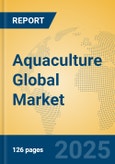Overview
Aquaculture, the farming of aquatic organisms, including fish, mollusks, crustaceans, and aquatic plants, has become one of the fastest-growing sectors in the food industry. The shift toward aquaculture is primarily due to overfishing in wild catch fisheries and the need for sustainable seafood sources. According to the Food and Agriculture Organization (FAO), aquaculture production reached approximately 114 million tons globally in 2020, valued at approximately $263 billion.Market Size and Segmentation
As of 2023, the global aquaculture market was valued at approximately $280 billion and is projected to reach $450 billion by 2030, with a compound annual growth rate (CAGR) of 8.2% during the forecast period. This growth can be attributed to several factors, including increasing consumer demand for fish and seafood products, innovations in farming techniques, and rising investments in aquaculture infrastructure.By Product Type
The aquaculture market is segmented by product type into the following categories:- Aquatic Plants: These account for a significant part of aquaculture, with increasing consumption of sea vegetables and algae.
- Crustaceans: Including shrimp and crabs, crustaceans hold a substantial share, feeding the growing demand for high-protein seafood.
- Diadromous Fishes: Species that migrate between fresh and saltwater, such as salmon and eels, are considered valuable in the aquaculture market.
- Freshwater Fishes: These include tilapia and catfish, which are popular due to their affordability and nutritional value.
- Marine Fishes: Species such as salmon and tuna are increasingly being farmed, contributing to market growth.
- Molluscs: Including oysters and mussels, they are also witnessing increased production due to their demand in various cuisines.
- Others: This category includes various lesser-known aquatic species that contribute to the market.
By Key Players
The competition in the aquaculture market is marked by several key players, including:- Maruha Nichiro
- Nippon Suisan Kaisha
- Thai Union Group
- Mowi (Marine Harvest)
- Mitsubishi Corporation
- Dongwon Enterprise
- Red Chamber Group
- Skretting
- Trident Seafoods
- Austevoll Seafood
- Inve Aquaculture
- Nireus
- Russian Aquaculture
- National Aquaculture Group
- Shanghai Kaichuang
- Zhangzidao Group
- Dahu Aquaculture
- Zhanjiang Guolian
- Kingbridge
- Shandong Homey
- Oriental Ocean
By Process
Aquaculture operations vary in processes utilized, including:- Extensive Aquaculture: Low-input systems that rely on natural productivity.
- Intensive Aquaculture: Higher input systems that allow for greater fish density and yield.
- Integrated Multi-Trophic Aquaculture (IMTA): Combining species at different trophic levels to optimize resource use.
By Application
The applications of aquaculture span various sectors, including:- Food Industry: The primary driver for aquaculture products, with seafood consumption on the rise.
- Pharmaceuticals: Using bioactive compounds derived from aquatic organisms for medicinal purposes.
- Cosmetics: Increasing use of marine extracts in skincare products.
By End-Use
The end-use segmentation includes:- Household: Average consumers purchasing seafood for home cooking.
- Food Service Industry: Restaurants and foodservice providers sourcing aquaculture products.
- Retail: Supermarkets and fish markets distributing aquaculture catch.
By Region
The aquaculture market is analyzed in key regions, including:- North America: Significant player with a focus on sustainable practices.
- Europe: Home to advanced aquaculture technologies and practices, with leading countries like Norway and Spain.
- Asia-Pacific: The largest producer of aquaculture products, with countries like China, India, and Vietnam leading the market.
- Latin America: Emerging market with growing investments from both domestic and foreign investors.
- Middle East & Africa: with expanding aquaculture farms and growing seafood demand.
Market Trends and Insights
Several trends are shaping the future of the aquaculture market:- Sustainability: There has been a marked trend toward sustainable aquaculture practices, such as IMTA, to reduce environmental impact.
- Technological Advancements: Innovations in breeding, feed efficiency, and health management are driving production efficiencies.
- Health & Nutrition Awareness: Consumers are demanding healthier seafood options, further bolstered by the recognized benefits of omega-3 fatty acids.
- Government Initiatives: Supportive governmental policies aimed at enhancing aquaculture production and food security are on the rise.
Market News and Policies
In 2023, various policies were introduced to improve aquaculture sustainability and efficiency globally.- The European Union unveiled initiatives to enhance sustainable fishing practices, aligning aquaculture operations with broader environmental goals.
- The U.S. government is championing Blue Economy initiatives focused on sustainable aquaculture practices as part of its broader push for economic resilience.
- In Asia, countries like Vietnam and India are investing in modern aquaculture technologies to boost productivity and meet international demand.
Key Development from Companies
Leading companies are actively pursuing strategies to enhance competitiveness and market share:- Thai Union Group is expanding its seafood portfolio through acquisitions and product diversification.
- Mowi has invested heavily in sustainable salmon farming and feed innovations.
- Maruha Nichiro is focusing on R&D to develop new seafood products tailored to consumer preferences.
Segment Forecasts (2025 - 2030)
Looking ahead, the aquaculture market is expected to continue its growth trajectory:- Aquatic Plants: Predicted to grow at a CAGR of 9.0% as demand for healthy, plant-based seafood alternatives increases.
- Crustaceans: Expected to maintain strong growth due to high-value shrimp farming.
- Diadromous Fishes: Demand for salmon continues to rise, driving increased farming investments.
- Freshwater Fishes: Popular choices like tilapia will show steady growth to meet local and export demands.
- Marine Fishes: Anticipated growth driven by improved farming methods and customer preferences towards products like tuna and sea bass.
- Molluscs: Growth driven by the increasing popularity of shellfish in various cuisines.
This product will be delivered within 1-3 business days.
Table of Contents
Companies Mentioned
- Maruha Nichiro
- Nippon Suisan Kaisha
- Thai Union Group
- Mowi (Marine Harvest)
- Mitsubishi Corporation
- Dongwon Enterprise
- Red Chamber Group
- Skretting
- Trident Seafoods
- Austevoll Seafood
- Inve Aquaculture
- Nireus
- Russian Aquaculture
- National Aquaculture Group
- Shanghai Kaichuang
- Zhangzidao Group
- Dahu Aquaculture
- Zhanjiang Guolian
- Kingbridge
- Shandong Homey
- Oriental Ocean








